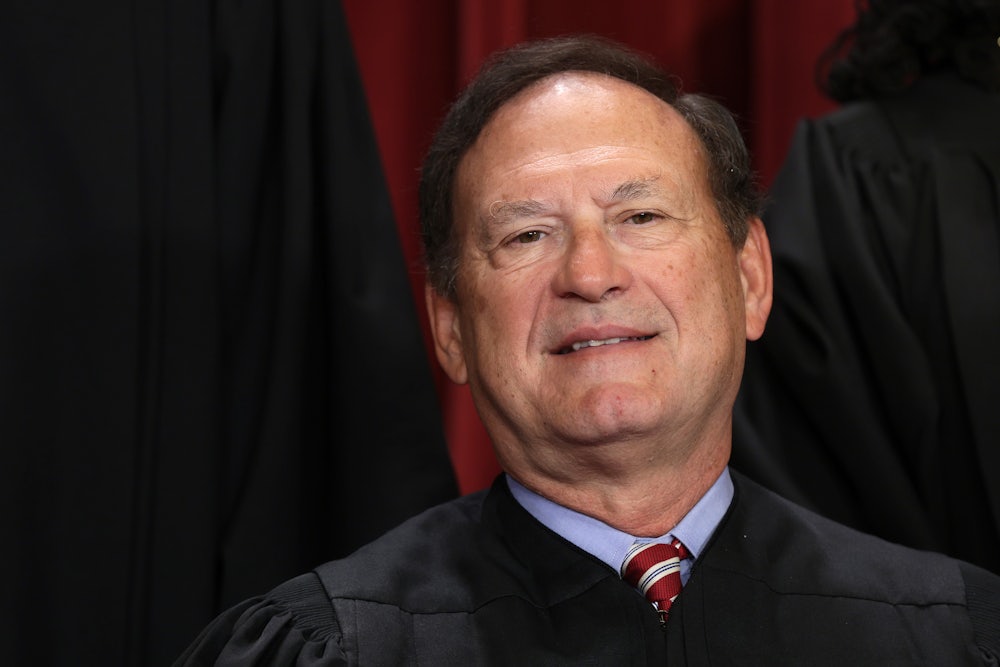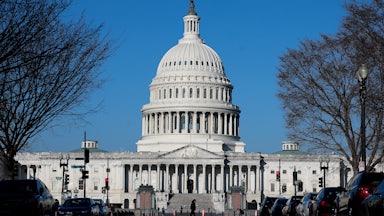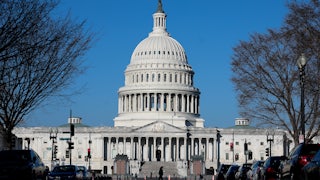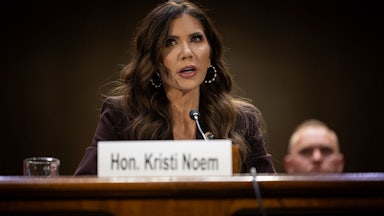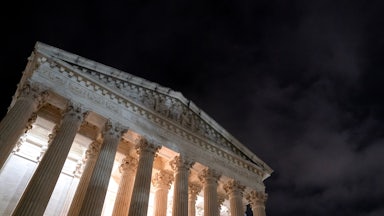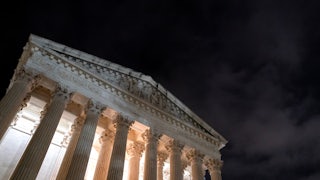Supreme Court Justice Samuel Alito has been in the spotlight lately, and not in a good way. Embattled over revelations of major ethics violations and calls for Supreme Court ethics reform and now the subject of an ethics charge by Democratic Senator Sheldon Whitehouse, Alito has fought back, particularly on the friendly turf of the Wall Street Journal editorial page. Most recently, in an obsequious interview conducted by the Journal’s James Taranto and lawyer David Rivkin Jr.—who, stunningly, has a case before the court that it will hear in the coming term—Alito said, “Congress did not create the Supreme Court.” He went on, “I know this is a controversial view, but I’m willing to say it. No provision in the Constitution gives them the authority to regulate the Supreme Court—period.” Alito followed this by declaring that he would not recuse himself from the case involving Rivkin.
This was the latest step in Alito’s defiant, intemperate, and in-your-face response to revelations about his ethics violations. One involved an unreported lavish fishing trip paid for by right-wing billionaire and bare acquaintance Paul Singer, who had business before the court. The second was Alito’s trip to Rome shortly after the Dobbs decision erasing Roe v. Wade, funded by an activist Notre Dame–based anti-abortion group that had filed an amicus brief in the case. When the watchdog journalistic group ProPublica contacted Alito before it published the blockbuster revelation about the fishing trip, he instead tried to preempt the story with a diatribe in The Wall Street Journal lamely defending the indefensible, including going into contortions to say that private jet travel did not require disclosure, and asserting that he was unaware that his benefactor had business before the court, despite multiple briefs showing just that.
Sam Alito identifies as an “originalist”—someone who ostensibly makes decisions based on the original intent of the Framers and their historical context. But no genuine originalist would make an astonishing, ridiculous, and utterly ahistorical assertion like the one in the Journal interview. It is true that when the Framers drafted the Constitution, they obviously created the three branches and defined their powers and functions. But as I used to tell my American Government students, while there are three equal branches, the Constitution itself makes clear the pecking order. Article 1, on Congress, is twice as long as Article 2, on the presidency—and it, in turn, is twice as long as Article 3 on the judiciary. Article 3 is spare in its detail, not least because the Framers left it to Congress to define the broader architecture of the judiciary and the roles of particular courts.
Congress appropriates all the money and has the power to tax—and to declare war. The president can veto bills, but Congress can override the vetoes as the last word. Congress can impeach and remove a president—a president cannot remove members of Congress.
What about Congress and the courts? To start with, Congress can impeach and remove Supreme Court justices, with no comparable power going the other way. The Senate can reject nominees for the court that have been proposed by the president. And Congress can, and has, added and subtracted members of the Supreme Court, going from its original six down to five and up to as many as 10 before settling at nine in 1869. But we also know that Article 3 gives little direct power to the Supreme Court. It has original, constitutionally mandated jurisdiction, but here is the critical element of Article 3, Section 2: “In all cases affecting Ambassadors, other public Ministers and Consuls, and those in which a State shall be Party, the Supreme Court shall have original jurisdiction. In all the other cases before mentioned, the Supreme Court shall have appellate jurisdiction, both as to Law and Fact, with such Exceptions, and under such Regulations as the Congress shall make.”
In other words, Congress was expressly given the ultimate authority to limit or remove the most critical power of the court, its appellate jurisdiction. Indeed, Democratic Congressman Sean Casten of Illinois has proposed a bill to remove most of the court’s appellate authority and give it to a special Court of Appeals. Beyond that, Congress, from the get-go, has regulated the nature of the Supreme Court and the judicial system, starting with the First Congress and the seminal Federal Judiciary Act of 1789. It established the modern federal court system, including circuit courts and district courts, and set the Supreme Court at six justices, one chief justice, and five associate justices. It also included a fierce debate over whether establishing a robust judicial branch could lead to judicial tyranny—a position led by the group of Framers closest in outlook to Alito, the Anti-Federalists.
That was followed by the Judiciary Act of 1793, which put in place a series of regulations on court activities and required all justices to “ride circuit”—to sit periodically on local circuits, something the justices despised but had to accept as a legitimate power of Congress. Many subsequent statutes regulating the judiciary have been passed since. As Amanda Frost has written, “Almost everyone accepts Congress’s broad authority to enact legislation affecting the day-to-day operations of the Court.” Congress has passed statutes authorizing justices to hire librarians, marshals, clerks, and secretaries; it established a quorum requirement of six justices to sit and decide cases, established the dates of court sessions, and gave it the oath of office requirement.
Ethics requirements? Congress over the past 30 years has subjected all federal judges, including Supreme Court justices, to financial disclosure, created stringent limitations on gifts, including defining what constitutes a gift, and set limits on outside income. While Alito has not complied fully with these requirements, he has filed his disclosure reports, making clear that at least implicitly, he accepts Congress’s authority to regulate behavior on the Supreme Court.
Of course, not every element of power in the branches is explicit; as the distinguished constitutional scholar Edward Corwin wrote decades ago, the Constitution is an “invitation to struggle” between the branches. The Supreme Court did assert itself with Chief Justice John Marshall’s action in Marbury v. Madison in 1803, which declared a narrow part of the 1789 Act unconstitutional because it added a provision to the original jurisdiction of the court. Interestingly, Marbury did not establish that precedent for many decades, but over the centuries, it mushroomed into a norm—not a constitutional provision—that the Supreme Court could negate any statute it deemed unconstitutional. But that power, with some New Deal exceptions, was rarely exercised until recent decades; no court has been more aggressive in blowing up acts of Congress than the Roberts court, and no justice has been more aggressive in intruding on Congress’s authority than Alito. For Alito, that includes, in the seminal Brnovich decision, ignoring an explicit provision in the Voting Rights Act and writing his own law to fit his ideological and partisan positions.
The U.S. Supreme Court is in the middle of an unprecedented crisis of legitimacy. Its approval rating has sunk to 40 percent, shockingly low for an institution that has generally been venerated by Americans. No doubt some of the problem stems from radical decisions like Dobbs; 57 percent of Americans disapprove of Dobbs, including a majority of men and women, with 43 percent strongly disapproving. But a large share of the disdain for the court stems from its blatant ethical lapses. One factor is the continuing refusal of Chief Justice Roberts to either chastise his colleagues who have violated clear ethical standards or move to apply a Code of Ethics like the one that applies to all other federal judges.
But the key is the justices who have not just shown a shocking disregard for ethical standards but have been disdainful of any criticism or efforts to implement needed reforms. While no one has been more stained by repeated ethical violations than Justice Clarence Thomas, the poster child for arrogance, insensitivity, and ethical failure is clearly Samuel Alito.
Only Alito has claimed that any response by the people’s branch to the ethics lapses by justices is invalid and unconstitutional. Wrong on the facts, wrong on the history, on the wrong side of honesty and ethical standards, Justice Alito and his colleagues need to be reined in. Since Chief Justice Roberts won’t do it, it is time for Congress to step up and save the court from itself.
